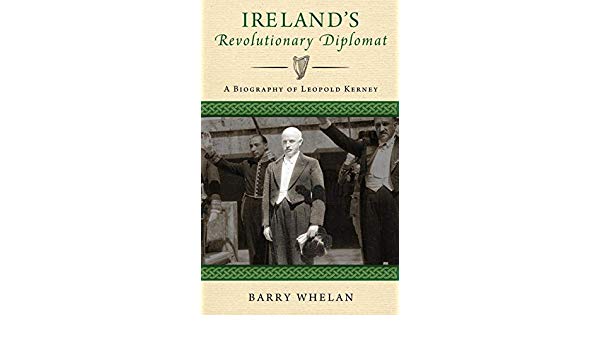Ireland’s Revolutionary Diplomat: A Biography of Leopold Kerney
by Barry Whelan (University of Notre Dame Press, US$50.00 / €54.95)
Joe Carroll
Leopold Kerney has not been treated well by some Irish historians over his controversial meetings with a top level Nazi official and a German intelligence agent in Madrid during a critical phase of World War II. They wanted to sound out Kerney, then Irish ambassador to Spain, on whether Éamon de Valera might be tempted to abandon neutrality in return for a united Ireland brought about by a future German victory in the West.
There are two versions of the meeting in August 1942, one by Kerney which he immediately sent to his superior in Dublin, Joe Walshe, Secretary of the Department of External Affairs. In it Kerney said he emphasised that Ireland’s neutrality was not for sale under de Valera.
The report by Kerney’s interlocutor, Edmund Veesenmayer, a member of the SS as well as a senior diplomat used by Hitler to engineer coups d’etat, portrays Kerney as saying that de Valera might waver if he thought a German victory was the most likely.
Reports by Helmut Clissmann, the German intelligence agent who had set up the meeting with Veesenmayer, also reported Kerney as speculating in a dangerous fashion about Ireland’s readiness to collaborate with Germany.
The trouble for Kerney was that the German versions of these meetings were made available to historians some years after the war while his report remained buried in the archives of the Department of External Affairs.
The late Prof. Desmond Williams of UCD, an expert in modern German history, had been invited by the British Government to edit wartime German documents.
He used this access to write a series of articles about the conduct of Irish neutrality in which he was highly critical of Kerney, whom he did not name, but who was clearly identifiable. The articles, published in the Leader, a weekly review, and the Irish Press, the Fianna Fáil party daily, in July 1953 led to Kerney suing Williams and the publications for libel.
Kerney, seeking a restoration of his good name and reputation, won apologies from Williams and modest damages from the paper and a token sum from the review. Yet historians, with some exceptions, have passed damning judgements on Kerney for meeting the Germans without prior authorisation from Dublin and for what he allegedly said.
Fortunately for him, de Valera also took over External Affairs and was able to fend off Joe Walshe and other critics from damaging his career”
Kerney’s role in the release of ex-IRA man Frank Ryan from a Spanish jail in 1940 into German hands had made historians speculate that his German contacts were closer than was prudent for a neutral ambassador.
In this book, Barry Whelan, who lectures in Irish and European history at Dublin City University, seeks to restore Kerney’s reputation while providing the first “complete biography” of his life and times. He has had access to Kerney’s private papers which contain his diaries and contemporary notes.
The reader will have to judge if Kerney was jeopardising Irish neutrality, or was doing what any skilled diplomat should do, keeping his Government as fully informed as possible. In any case, Whelan has given an engrossing account of how Kerney had to do his job handicapped by poor communications and frequently inadequate funds.
Reports by Helmut Clissmann…also reported Kerney as speculating in a dangerous fashion about Ireland’s readiness to collaborate with Germany”
His early career as a commercial representative in Paris of the First Dáil and its Government is also described. He did valuable work eluding British controls to set up markets for Irish farmers on the continent and even providing shipping.
His efforts here and in publicising the poor treatment of Republican prisoners during the Civil War brought him to de Valera’s attention and they became warm friends. This friendship safeguarded his career when de Valera came into power in 1932 and ensured Kerney was restored to the diplomatic service.
Fortunately for him, de Valera also took over External Affairs and was able to fend off Joe Walshe and other critics from damaging his career. But Kerney’s admiration for de Valera went too far when without sanction from Dublin he followed de Valera’s example in offering condolences on the death of Hitler.
The author gives a valuable insight into the early years of the Irish diplomatic service by going behind the official records. He has also helped restore the reputation of one of its pioneers.



